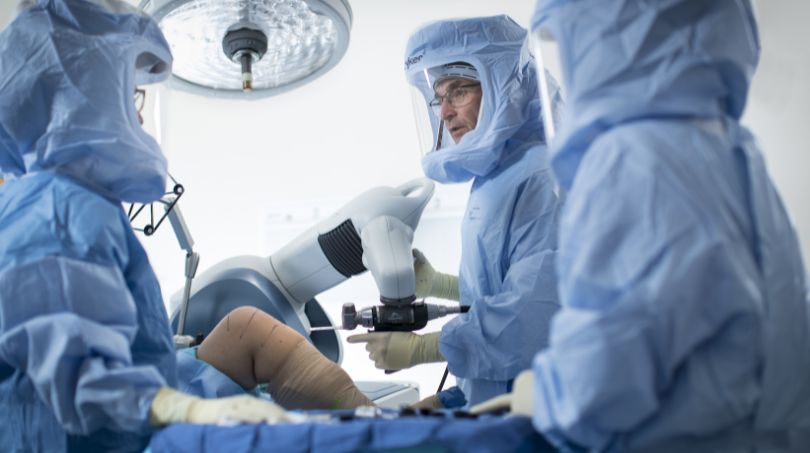Revitalize Your Summer Menu: 5 Creative Ways to Incorporate Coconut Water
18 May 2024The absolute best way to deal with the rising temperature under the…
read moreKnee replacement is also commonly known as knee arthroplasty, it is a surgical procedure performed to replace a damaged or worn-out knee joint with an artificial joint. This procedure is typically suggested to those who have severe knee pain or impaired knee function due to such conditions like osteoarthritis or any type of injury.
During Knee replacement surgery, damaged portions of the knee joint are removed and replaced with artificial joints which are made of components like metal alloy, high-grade plastic and polymers. It is designed in such a way that it mimics like a healthy knee joint.
Prior to the surgery, the orthopedic will first evaluate your medical history, conduct a physical examination and may order diagnostic test such as X-Ray, MRI or blood test. During the surgery, general anesthesia will be provided during the procedure and an incision will be made in front of the knee, remove the damaged bone and cartilage and then attaching a new artificial joint. The kneecap can also be replaced depending upon the situation and case.
After the surgery, you will be monitored in a recovery room and soon after some time physical therapy and rehabilitation will begin to help you regain strength, improve range of motion and slowly learn to walk with assistance.
Full recovery may take several months but it depends upon individuals health, age and the extent of the surgery. Gradually it will take time to increase strength and to grab back to your daily routine.
Knee replacement surgery is generally safe, but like any surgical procedure, it carries some risks. Possible complications may include infection, blood clots, knee joint stiffness, implant loosening or wear, nerve damage, and persistent pain. Your surgeon will discuss these risks with you before the surgery.
Have a look at Mole Removal Surgery
There are different type of knee replacement procedures based on the extent of the joint damaged, The most common types include total knee replacement, partial knee replacement and complex knee replacement.
Here are a few common conditions in which knee replacement is carried out:

Note: It’s important to note that knee replacement surgery is not the first line of treatment for these conditions. Typically, conservative measures such as medication, physical therapy, lifestyle modifications, and assistive devices are initially recommended. However, if these conservative treatments fail to provide relief and the knee joint becomes severely damaged, knee replacement surgery may be considered as a treatment option.
Consider reading- Lasik eye surgery
Here is an overview of the treatment process of knee replacement surgery:

The cost of knee replacement surgery in India can vary depending on several factors, including the city, hospital, surgeon, type of knee replacement, and any additional medical services required. Generally, knee replacement surgery in India is more affordable compared to many other countries.
Read more- Plastic Surgery Cost in India
After surgery, the patient typically stays in the hospital for a few days. Rehabilitation begins soon after, focusing on strengthening the knee, improving range of motion, and learning to walk with assistance. Physical therapy is an important part of the recovery process, which continues as an outpatient. Full recovery can take several months.
Like any surgical procedure, knee replacement surgery carries some risks. These can include infection, blood clots, implant loosening or wear, nerve damage, persistent pain, and stiffness. It's important to discuss these risks with the surgeon before the surgery.
The durability of a knee replacement can vary among individuals, but on average, a well-functioning knee replacement can last for 15 to 20 years or more. Factors such as the patient's activity level, weight, and overall health can influence the longevity of the implant.
Knee replacement surgery preparation is critical for a favourable outcome. Patients can consult their doctors about the next stages, which often involve pre-operative assessments, medical history reviews, and blood testing. Inquiring about any lifestyle modifications, such as fitness regimens or food changes, might be useful as well.
Understanding anaesthesia choices and discussing post-operative pain management strategies with the surgeon can help allay fears. Inquiring about the projected duration of the surgery and hospital stay might also help to clarify the process.
There are numerous types of knee replacement prostheses, and it is critical to understand your alternatives. Patients may learn about the distinctions between standard knee implants and innovative designs, such as partial knee replacements or less invasive treatments, by asking their doctor.
Inquiring about the materials used in prostheses, such as metal, plastic, or ceramic components, might assist patients in making educated surgical selections. Patients may also wish to investigate the possible benefits and cons of various implant kinds in order to choose the one that best matches their unique needs and lifestyle.
Knee replacement surgery is carried out so that the individual can have better functional knees. One may need this Surgery for conditions like osteoarthritis, rheumatoid arthritis, post traumatic arthritis, knee deformities, some other conditions. In all these conditions one may suffer from pain and swelling. The symptoms can interfere in daily functions and one needs to keep a check on symptoms. By consulting a good doctor one can get help and knee replacement surgery can be carried out. Consult a good specialist for undergoing this surgery.
With over 5000 doctors and experts in the healthcare field medical directory provides a listing of all doctors across a wide variety if medical fields
The absolute best way to deal with the rising temperature under the…
read moreआपके आसपास बहुत से पेड़ पाए जाते हैं इन्हीं में से एक…
read moreAyurveda, the old Indian wisdom handed over from ancestors, contains an amazing…
read moreक्या आप भी उन लोगों में से हैं जिन्हें सफर के दौरान…
read more
© Copyright 2024 PlanMyMedical. All rights reserved.
Comments (1)